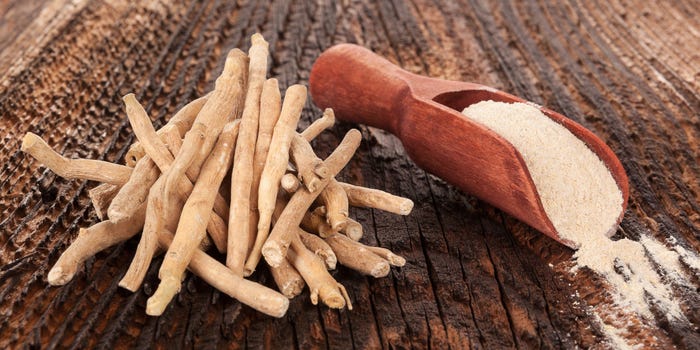10 Incredible Health Benefits of Ashwagandha According to Science

Ashwagandha, also known as Indian Ginseng, is immensely hailed as one of the most powerful herbs in Ayurveda. It is revered as a ‘Rasayana’ or tonic that offers a multitude of health benefits. According to NCBI, it is a gold standard nervine tonic as it helps fight stress, anxiety, and depression. Let’s discuss in detail ‘what is ashwagandha’ and how this ancient medicinal herb benefits the mind and body.
What is Ashwagandha?
Ashwagandha which is an evergreen shrub proliferates in different parts of the Indian sub-continent, North Africa, and the Middle East. Its primeval history supports the fact that it is one of the oldest herbs known to have existed in the world. Its use in traditional medicine owes to the medicinal properties of its fruit and root. Well, the term ‘ashwagandha’ is a combination of the words ‘ashwa’ (horse) and ‘gandha’ (odor). This name is given to the herb as its root has a horse-like smell.
In Ayurvedic medicine, ashwagandha is regarded as a Rasayana aka tonic or rejuvenator. Rasayana is generally an herbal concoction that promotes mental & physical health and helps maintain youth.
Health practitioners use this powerful adaptogen as it increases the body’s resilience to stress. Some claim that it can also benefit people with Alzheimer’s disease and cancers.
Hope we have given you enough scoop on what is ashwagandha. Scroll ahead to discover its health benefits….
Health Benefits of Ashwagandha
To date, Ashwagandha has been utilized to treat several mental and physical problems including stress, memory loss, constipation, skin problems, and diabetes, to name a few. Here are some ashwagandha benefits that are backed by science and research:
1. Reduces Anxiety & Stress
Ashwagandha is a well-known adaptogen that helps the human mind adapt to stress. It can also take the edge off anxiety. According to one study conducted on humans, it was observed that an everyday dose of 240 mg of the herb substantially lessened stress levels by reducing the levels of the stress hormone cortisol. There was a 69% reduction in anxiety in people who took ashwagandha as compared to 11% who took a placebo.
Another study found that 88% of respondents who relied on ashwagandha were able to manage their anxiety levels within 6 weeks as compared to 50% of individuals who belonged to the placebo group.
2. Has Medicinal Properties
If you are wondering what is ashwagandha good for when it comes to common health problems, hold on. The age-old herb has medicinal properties that can induce natural healing. The magic herb is known to boost concentration, increase stamina, and improve immunity. It also relieves fatigue and stress levels in expecting women. Thanks to its immunomodulatory and therapeutic properties!
There also exists a study that talks about the herb’s anti-inflammatory effects. Due to this, ashwagandha can soothe skin inflammation and safeguard the body against certain diseases like arthritis. Some studies even indicate that it also has antitumor and hemopoietic properties that tend to have a positive impact on the central nervous system and cardiopulmonary system.
3. Can Treat Insomnia
Many practitioners recommend the use of ashwagandha to those with fitful sleeping patterns. The herb delivers a sleep-inducing effect and can prove to be a boon to people who struggle to get a good night’s sleep. Simply add recommended dose of ashwagandha powder in warm milk and drink it every day before going to bed.
4. Lowers Blood Sugar Levels
A 30-day long study indicates that ashwagandha significantly reduces blood sugar levels. A clinical trial in diabetic patients was also conducted that compared the herb intake with an oral hypoglycemic. Later it was found that blood glucose levels in those patients reduced considerably as compared to that of an oral hypoglycemic.
Doctors generally suggest ashwagandha powder to those with diabetes. The powder is taken once or twice a day depending on the person’s exact condition.
5. Can Help Those with Arthritis
Arthritis is inflammation of the joints whose major symptoms include pain and swelling. There are several types of this joint disease or pain, such as rheumatoid arthritis, osteoarthritis, and gout, to name a few.
As per research conducted in 2015, Ayurvedic treatment including Ashwagandha powder is efficacious in treating rheumatoid arthritis and other joint-related concerns.
6. Can Treat Certain Cancers
According to NCBI, ashwagandha not only holds the therapeutic potential to fight against cancer but also has cancer-preventive properties. Some animal studies also claim that the Ayurvedic herb can treat a wide range of cancers including mammary cancer and lung cancer. No doubt that ancient herb has anti-tumorigenic properties; further studies are required to exert similar benefits on humans.
7. Benefits Heart Health
Many people swear by ashwagandha for optimal heart health. Daily use of ashwagandha powder in one’s diet can lower high cholesterol and high blood pressure and also ease chest pain.
A 2015 study states that the root of the herb can improve cardiorespiratory endurance in humans and eventually boost their heart health.
8. Increases Muscle Strength
If you want to improve the effects of your strength-training workout, ashwagandha can help you. As reported by research, the herb greatly enhances muscle strength on leg-extension exercise, bench-press exercise, and the like.
Another study suggests that the herb improves lower limb muscular strength, generalized weakness, and also neuro-muscular coordination.
9. Can Help in Case of Neurodegenerative Conditions
Propellants say ashwagandha can slow down and even possibly reverse some forms of nerve cell damage which is responsible for Alzheimer’s and Parkinson’s.
According to a 2011 review from a trusted source, some studies have studied the efficacy of ashwagandha in terms of brain function. The studies show that the herb can help those coping with Parkinson’s disease, Alzheimer’s disease, and other neurodegenerative disorders.
10. Can Boost Male Fertility
Ashwagandha is often touted for its ability to cure male infertility problems by increasing testosterone levels and sperm count. A study confirmed that infertile men who consumed the herb were able to increase their sperm count within 3 months.
In another scientific study, men who took ashwagandha had better sperm quality. Eventually, 14% of their sex partners got pregnant after 90 days of treatment.
Other Benefits of Ashwagandha
Some other ashwagandha benefits include:
- Reduces symptoms of depression
- Lowers cortisol levels
- Boost memory function
- Improves elasticity of the skin
- Helps heal acne and breakouts
- Can treat asthma
- Soothes ulcers and inflammation
- Benefits hair health
- Can aid in weight loss
So, now if you ask – what does ashwagandha do? We hope you have got your answer!
Safety & Concerns
If the question – “is ashwagandha safe” is striking your mind right now, take a deep breath. Ashwagandha is safe for most individuals if they stick to the prescribed dosage. However, the long-term effects of the herb are still vague to date. Also, taking large amounts is known to upset the digestive system by causing nausea and diarrhea.
Well, there are some safety concerns associated with the usage of ashwagandha. Pregnant women and those with autoimmune diseases should refrain from taking it. Also, do consult your healthcare provider before opting for the medicinal herb if you have thyroid, rheumatoid arthritis, diabetes, and other health concerns.
Note that FDA doesn’t approve of certain herbal supplements with ashwagandha and warns people against the use of the same. There is a high possibility that herbs can contain impurities like heavy metals that can impact your health negatively. So, always buy from a trusted manufacturer and read labels before buying any herbal supplement.
How to Use Ashwagandha
The ashwagandha dosage will depend on the individual’s needs and his condition. The herb is available in the form of ashwagandha powder, liquid, and capsule. Capsules are imbued with 250 to 1,500 mg of the herb.
Well, while some sources suggest intake of 250–600 mg/day, others recommend higher doses. It’s wise to consult your practitioner to know the dose suitable for your needs.
The Bottom Line
Ashwagandha is highly utilized in Ayurvedic treatments as it offers plenty of health benefits. According to science, the ancient herb helps combat stress and anxiety, improve male infertility, slow down neurodegenerative disorders, and improve arthritis.
Although researches have been done regarding ashwagandha’s ability to cure certain health problems, further studies are required to support the claims entirely. Also, there are some side effects related to high dosages of the herb along with safety concerns. Talk to your doctor before resorting to these herbal supplements if you rely on medications, are pregnant, or have health problems.
.











Megha
Nice information about the most talked about herb
Naman Munjal
Thanks for the share
Neha Kakkar
Very Informative and Useful.
Mahir
Awesome read
Anita
Great article,, thanks for sharing
Namita
Very informative and useful blog
Shalini mehta
Thanks for sharing such helpful information
Bhavna
Something new and helpful!
Shruti
Except 2-3 benefits, all others came as surprise.. Thanks a lot for sharing.. Very well described.